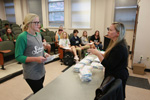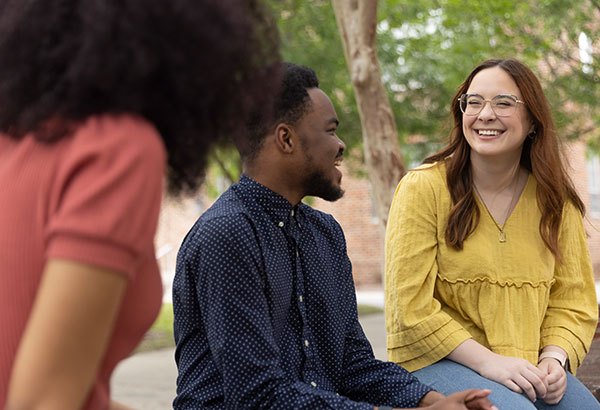Grant from 23andMe aids in genetics instruction at Southeastern
Wednesday, October 4, 2017 
by: Rene Abadie
LEARNING ABOUT GENETICS – Southeastern Louisiana University nursing student Emily Howell of Ponchatoula, left, receives her 23andMe Health + Ancestry Service testing kit and instructions from Southeastern Biology Instructor Tara Turley-Stoulig. Southeastern students are participating in an interactive genetics course designed to provide a more intensive orientation to the topic of human genetics. The project is sponsored by the genetics testing firm 23andMe, Inc.
HAMMOND – An educational grant from the genetics testing firm 23andMe, Inc. (“23andMe”)
will enable some Southeastern Louisiana University students taking undergraduate biology
courses the opportunity to gain a greater understanding of genetics than in a traditional
course.
Biology Instructor Tara Turley-Stoulig was awarded 100 complimentary 23andMe
Health + Ancestry Service kits after applying to the 23andMe Education Grant program.
Turley-Stoulig was selected as one of the three grand prize winners for her innovative
teaching proposal that advances genetics education.
“We will be using the 23andMe Health + Ancestry Service to give students the
opportunity to gain greater insight into basic genetics,” Turley-Stoulig said. “These
will be very interactive classes with lots of participation by the students.”
Approximately 100 students in her introductory biology course and genetics course
will have the option to participate in the project.
Turley-Stoulig believes students are expected to show significantly more interest
in the topic of genetics when their personal profiles are involved.
“The project will enhance the biology learning experience and provide a mechanism
by which students become aware of technologies and information that they may not otherwise
have exposure to,” she explained. “In addition, I think this may encourage students
to pursue studies in genetics and other STEM (science, technology, engineering and
math) disciplines.”
Students involved in the project will take a pre-assessment test to gauge their
current knowledge of genetics and an after-project test to determine what they learned.
Turley-Stoulig said the science behind the genetics testing will be discussed,
including the processing of the sample and how the data is generated. Included will
be instruction on the molecular techniques used in the lab.
Using the 23andMe kits, the students will provide a saliva sample in the tube
provided in the kit. Once results are available online, the class will be able to
talk about what the data means, Turley-Stoulig said.
“We will involve the students in learning how to interpret the data from their
results so they can see frequencies of certain variants in the class and learn about
human traits,” she said. “It’s important that the students learn what the data can
and cannot tell you.”
A final aspect of the program involves a collaboration with the Southeastern
Department of Computer Science and Industrial Technology. Working with Assistant Professor
of Computer Science John Burris, the students can opt-in to share their 23andMe genetic
data to be mapped in mathematical algorithms to yield an artistic rendition of their
genetic information. The algorithms will be used to create a musical rendition of
each student’s genetic data and a piece of computer-generated visual art.
“This is an unusual approach to genetics data interpretation, but it is a fun
and creative approach that allows students to appreciate their genetic makeup in a
different light,” Turley-Stoulig said.
“We expect this project to enhance the biology learning experiences for undergraduate
students,” she said. “Research shows that diverse modes of instruction result in increased
learning, and by employing this model the students will be exposed to higher-level
lab skills and techniques that are not generally covered with students at this level.”






